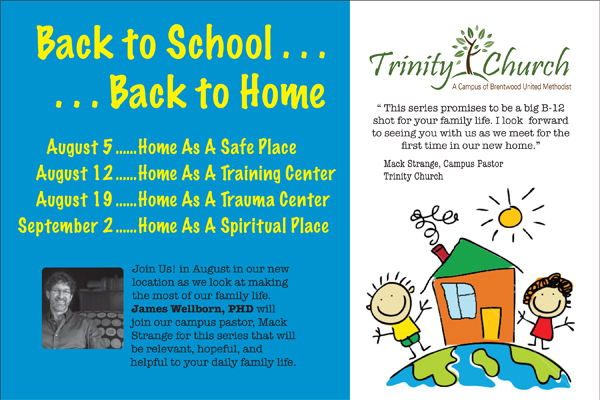Let’s see. I’m on my third visit with the folks at Trinity Church and so far I’ve sweated in terror, laughed a lot and, now, cried. (I had this terrible fear I was channeling Jimmy Swaggart from back in my neck of the woods.) Why cried you wonder? Because I talked of my beloved grandmother; my beloved DEAD grandmother. That’s why. So just shut up!
We were SUPPOSED to talk about how the family is a place that helps people deal with stress, challenges, difficulties and trauma they encounter in their lives (not have an Oprah moment). Mack’s scripture was from Galatians: “Carry each other’s burdens, and in this way you will fulfill the law of Christ.” (Galatians 6:2). He talked about the importance of being observant (especially self-aware), competent and connected. He mentioned that kids used to worry about simple little things in the 50s versus nuclear war, divorce, etc. during the 90s. This led to us talking about the difference between trauma (when something bad happens to you emotionally or physically) and anxiety (when you worry that something bad could happen to you). A discussion about how to buffer the unrelenting news and information (and the distortion of information to make news more exciting) was put off for another day.
What we did talk about was how parents can be more observant, competent and connected. Being observant when it relates to trauma or anxiety requires a couple of things. To start with it helps to be observant of your own emotional state. It is the best way to identify what you need (and, therefore, be more likely to get it). You also can more accurately identify the emotional experiences of others, like your kids. But when it comes to kids, it is important to notice changes in their behavior. When kids start doing things differently (e.g., sleep more, more irritable, more withdrawn, more emotional, grades decline, etc.) it is a sign that something is going on. This means you need to already know what their usual “state” is to tell if it changes. And what’s the best way to notice what is going on with your kid? Spend time together. (Is it becoming obvious what my soap boxes will be? I keep harping on these over and over. Watch for one of the other ones in the connect section below.)
Competence includes both your ability as a parent to help your kid in times of need as well as helping them develop the skills they will need to weather the storms of difficulty and crises that blow into their lives. One of the most important roles we fulfill as parents is in providing a sense of perspective for our kids. When things go badly, they need to have a sense of hope for the future and a promise of better things to come. (This requires us to be able to see the same potential.) Faith beliefs sit squarely in this area. But, also, it is important for our kids to understand that dealing with difficulty in the long term includes continuing to move forward in life. Parents can help by validate their kid’s emotional experiences (“I know, it hurts really bad.” “It’s no wonder you are so mad. Who wouldn’t be?”) and then getting them back on their feet and back into the stream of life (rather than withdrawing or avoiding things).
Kids can especially benefit from the awareness that they, too, have something to offer others who are hurting. They are not only the recipient of support and aid but can also provide it, however limited it may be. As a parent, you can help your kid recognize that there are things they can do (e.g., giving a hug, getting things for someone who is feeling poorly, etc.) while making sure they don’t feel like they are responsible for things they can’t do (e.g., take over and make decisions, fix problems with the family, etc.).
And last, and most importantly, a home that helps you heal from trauma is marked by genuine, supportive and loving connections with other people. Kids need comfort when overcome by emotions. Home needs to be a place where a loving embrace (both physically and emotionally) awaits you when things get difficult in your life. For me, that is the image of arriving at my grandmother’s house, being swept up into her loving arms and hugged for all I was worth.
At its heart, home is a place to rest, repair and restore your soul (which will be discussed further during the final part of this series on 9/2/12). At best, home is a retreat from the harsh realities of life. While you can’t protect your kid from pain and suffering, you can help them keep sight of the beauty that surrounds them, offer comfort to others who journey along beside them and to search for a purpose worthy of devotion.

